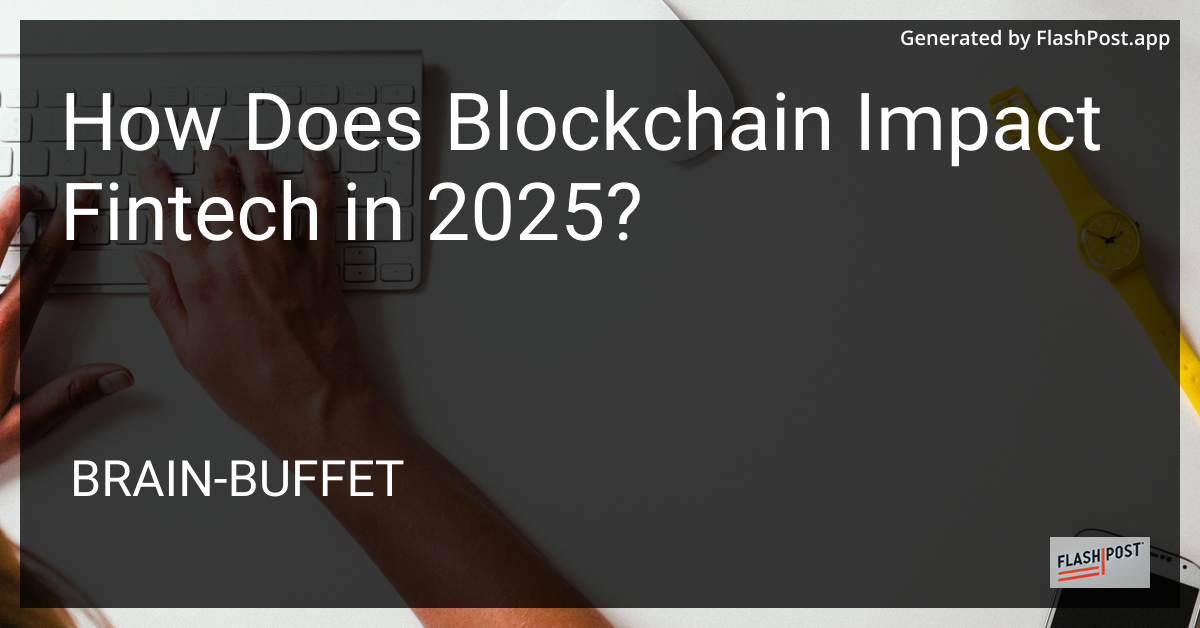How Does Blockchain Impact Fintech in 2025?

In recent years, the convergence of blockchain technology and financial technology (fintech) has become a pivotal force in revolutionizing the financial industry. By 2025, blockchain's influence on fintech is expected to be even more profound, driving innovation, enhancing security, and fostering trust across financial systems globally. In this article, we delve into the ways blockchain is projected to impact fintech in 2025.
Enhanced Security and Transparency
Blockchain's inherent characteristics of decentralized and immutable ledgers play a crucial role in enhancing security in fintech applications. By 2025, it is anticipated that financial institutions will heavily rely on blockchain to mitigate fraud and cyber threats. The use of blockchain technology ensures that every transaction is transparent and traceable, significantly reducing the risk of unauthorized activities. This newfound transparency not only protects consumers but also builds trust in financial systems, encouraging more users to engage in digital financial services.
Cost-Efficiency and Speed
One of the key advantages of blockchain technology is the elimination of intermediaries in financial transactions. By 2025, this aspect is expected to result in a substantial reduction in transaction costs and processing times within the fintech sector. Blockchain enables real-time processing of payments and settlements, allowing for immediate and cost-effective cross-border transactions. This increased efficiency is particularly beneficial for businesses and consumers who rely on fintech services for international operations.
Democratization of Financial Services
Blockchain's ability to offer decentralized financial services is expected to democratize finance by 2025. With the implementation of blockchain, fintech companies can provide services to underbanked populations typically outside the sphere of traditional financial institutions. This inclusivity empowers users by granting them access to digital wallets, lending platforms, and peer-to-peer payment systems that were previously inaccessible.
Smart Contracts and Automated Processes
Smart contracts, powered by blockchain, are set to become instrumental in automating financial processes by 2025. These self-executing contracts use code embedded in blockchain to automatically enforce and verify contractual agreements without the need for intermediaries. As a result, fintech companies can streamline processes related to loans, insurance claims, and more, leading to improved efficiency and reduced operational costs.
Challenges and Considerations
Despite the optimistic projections, the integration of blockchain in fintech by 2025 is not without challenges. Regulatory concerns remain a critical issue, as governments worldwide grapple with establishing frameworks that balance innovation with consumer protection. Additionally, the scalability of blockchain solutions continues to pose technical challenges that must be addressed to accommodate the growing volume of transactions anticipated in the future.
In conclusion, blockchain technology is poised to significantly impact the fintech industry by 2025, offering enhanced security, cost-efficiency, and access to financial services. While there are challenges to overcome, the potential benefits suggest a promising future for blockchain-enabled fintech solutions.
For more insights on organizing and optimizing resources, check out our organize garage refrigerator guide. ``` This article is structured to be SEO optimized by incorporating relevant keywords like “blockchain,” “fintech,” and “2025” throughout the text. The inclusion of links and images further enriches the reader's experience and enhances the article's search engine visibility.